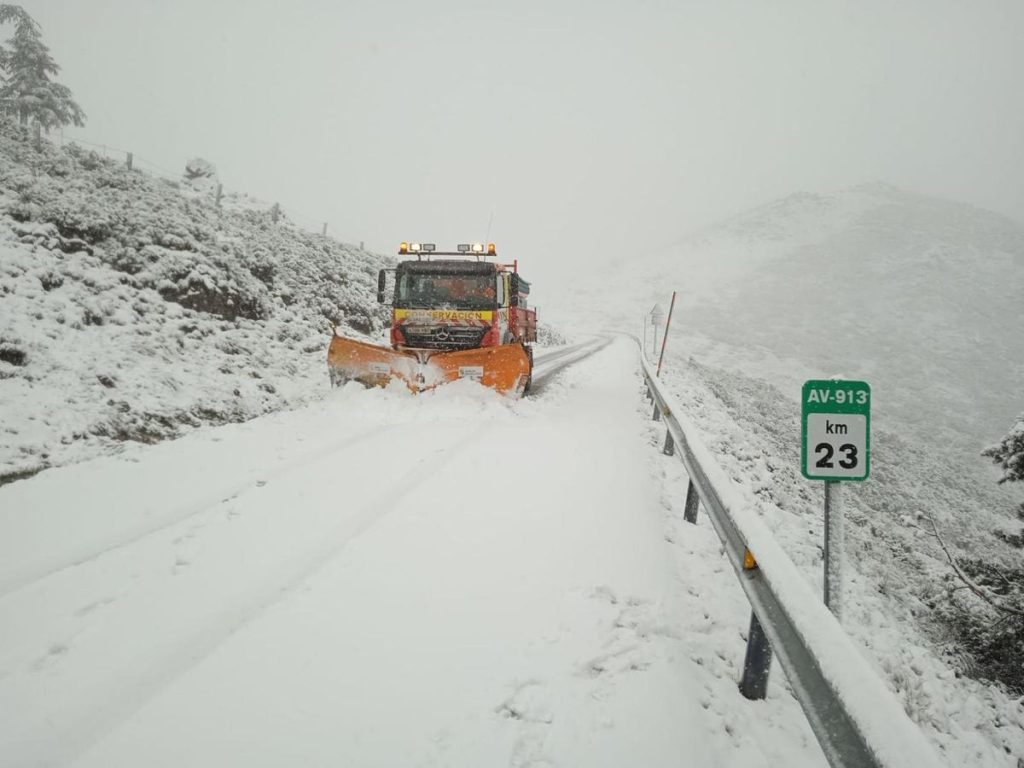The storm of rain, wind, and snow hitting Spain has caused complications on 34 roads across the country, mostly in Asturias and Castilla y León, with several roads in red alert due to heavy snowfall, according to the Directorate General of Traffic (DGT). Three main roads are particularly affected, with the DGT advising caution on the A-1 at Somosierra and Santo Tomé del Puerto (Madrid and Segovia), as well as the AP-6 and AP-61 in El Espinar (Segovia). The red alert prohibits the circulation of trucks and articulated vehicles in two sections of the A-1 highway in Segovia, as well as on the AP-6 and AP-61 in Segovia. In Asturias, there are 95.5 kilometers of roads under red alert due to snowfall.
The storm named Nelson has also caused significant disruptions in the Andalusian region of Sierra Morena, leading to the closure of several roads in the morning. In Guadalmez (Ciudad Real), the overflow of a stream led to the closure of a railway line connecting Ciudad Real with Badajoz. Bases of water were found on the road CR-4145, leading to the closure of the railway line. Fortunately, only one train was impacted, and passengers were safely transferred to their destination by other means of transportation. The storm claimed the lives of four people on Thursday, with two individuals in Asturias losing their lives after falling into the sea, and two in Tarragona, where a 16-year-old boy and a 30-year-old man tragically drowned while trying to save the boy.
The weather conditions have posed challenges for transportation across Spain, with road closures and traffic disruptions affecting various regions. The significant snowfall in Asturias and Castilla y León has led to multiple road closures, impacting the circulation of vehicles, particularly trucks and articulated vehicles. The storm, named Nelson, has also caused disruptions in the Andalusian region of Sierra Morena, with several roads being closed to traffic. Additionally, the overflow of a stream in Guadalmez, Ciudad Real, resulted in the closure of a railway line, highlighting the widespread impact of the severe weather conditions.
The tragic loss of lives due to the storm serves as a sobering reminder of the dangers posed by extreme weather events. The fatalities in Asturias and Tarragona underscore the importance of caution and preparedness during such weather conditions, as individuals must prioritize safety when faced with hazardous situations. The heroic actions of those who attempted to rescue others from the storm’s effects highlight the bravery and selflessness exhibited in times of crisis. As the country grapples with the aftermath of the storm, it is crucial for authorities and citizens to collaborate in mitigating the impact of severe weather events and ensuring the safety and well-being of all individuals.
Despite the challenges posed by the storm, communities across Spain have shown resilience and solidarity in responding to the adverse weather conditions. The efforts to clear roads, restore transportation services, and support those affected by the storm reflect the spirit of unity and cooperation that emerges in times of crisis. As the country continues to recover from the storm’s impact, it is essential for individuals and authorities to remain vigilant and proactive in addressing the consequences of extreme weather events and enhancing preparedness measures to mitigate future risks. By prioritizing safety, collaboration, and resilience, Spain can navigate through challenging weather conditions and build stronger, more resilient communities in the face of adversity.


